Yes, you can get Type 1 diabetes as an adult. My husband's diagnosis at age 33 had a huge effect on our family, but with a positive attitude and a lot of trial and error, you can find your new normal and live life to the fullest!
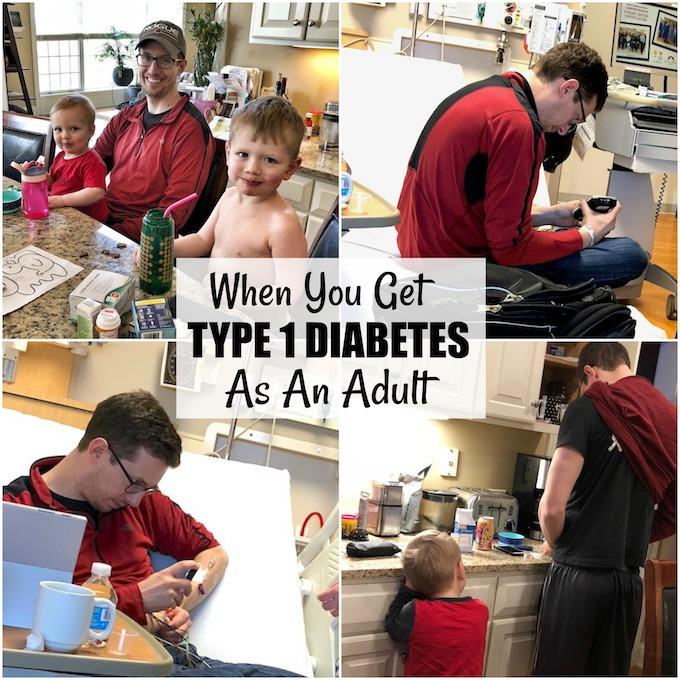
Hi friends!
As many of you know if you follow me on social media, two weeks ago my husband was diagnosed with Type 1 diabetes at the age of 33. Since this is a major diagnosis, impacting pretty much all areas of our life, I wanted to take some time and write down our story. I've discovered that many people don't actually know a lot about type 1 diabetes so I think it's a good opportunity to use this platform to educate. I've also realized just how much a diagnosis like this (of a chronic, long-term autoimmune disease) affects not only the person themselves, but family members and those around them as well….so I wanted to give you some insight into how it's affecting him, me and our family in general.
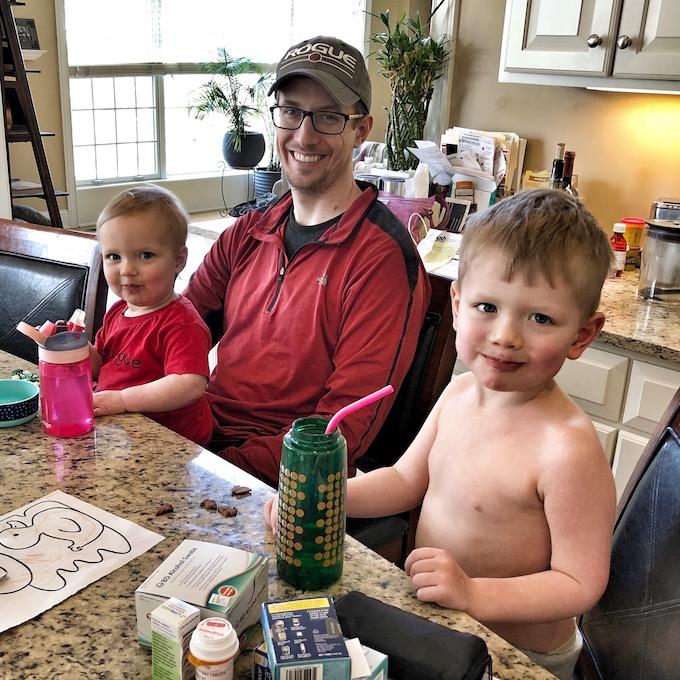
Types of Diabetes
So, first a little clarification for those of you who don't know -there are several types of diabetes. Before his diagnosis, I knew the basics about type 1 and 2 and that was about it. I was not an expert then and I'm certainly not an expert now, but I've done a lot of reading lately and learned a lot! So here's a brief overview:
Type 1 diabetes is an autoimmune disease with a fairly sudden onset. While it is most often known for being diagnosed in young children and teens (often known as juvenile diabetes), it's actually almost as common for people in their 20's & 30's (and beyond) to be diagnosed. With Type 1, the body's immune system attacks the cells in the pancreas that produce insulin so they stop producing it. While the exact cause is unknown, it's likely a combination of genes you're born with and an environmental trigger that activates it. If you're not producing insulin, sugar builds up in the blood instead of going into cells where it's needed…so you need injected insulin (a combination of long-acting and short-acting) for the rest of your life.
Type 2 diabetes has a more gradual onset. Your body is still producing insulin, you just become less sensitive to it over time. Typically, you can initially manage Type 2 with diet and exercise and take oral medication to stimulate the pancreas to make more insulin. Eventually, your pancreas may stop working and you'll require insulin. The cause of type 2 diabetes is multifactorial- you can inherit genes that make you more susceptible but lifestyle factors like diet, exercise & obesity also play a role.
In addition, there's another type known as LADA- latent autoimmune diabetes in adults (sometimes called type 1.5 diabetes), that is often initially misdiagnosed as Type 2. They have similar symptoms but LADA develops faster and people are often at a healthy weight, whereas Type 2 is often (but not always) diagnosed in people who are overweight. So even though they may initially be able to get by because their pancreas is still producing some insulin, oral drugs prescribed for type 2, like metformin, will eventually stop working for LADA patients because their immune system will continue to destroy insulin-producing cells.
There are blood tests that can be used to diagnose LADA by measuring the amount of c-peptides in the blood. C-peptides are a byproduct of insulin production, so low levels can indicate that your body is not producing much insulin on its own. Another blood test often given to LADA patients looks for the presence of insulin-destroying antibodies.

Hubby's Story
Here's what happened to my husband: Starting sometime around the beginning of 2018, we noticed he was having some unusual symptoms that included increased thirst, increased hunger and increased urination. He was feeling generally sluggish, having some vision changes, losing some weight etc. I prompted him several times to go to the doctor for his annual exam. We knew something was wrong but weren't sure whether it was diabetes, thyroid-related etc.
He finally scheduled his exam for the first week of March and on Friday, March 9th he had his appointment where he shared everything with his doctor. They took a lot of blood for bloodwork and also took a urine sample. Within an hour or two, they had called him back and told him that his urine test showed his blood sugar was over 400, there were ketones in his urine and he needed to go to the ER immediately.
His parents came over to watch the kids and we headed to the ER. There, they did more bloodwork, gave him insulin and fluid and decided to admit him. My parents drove from Chicago to stay with the kids while we handled all of this.
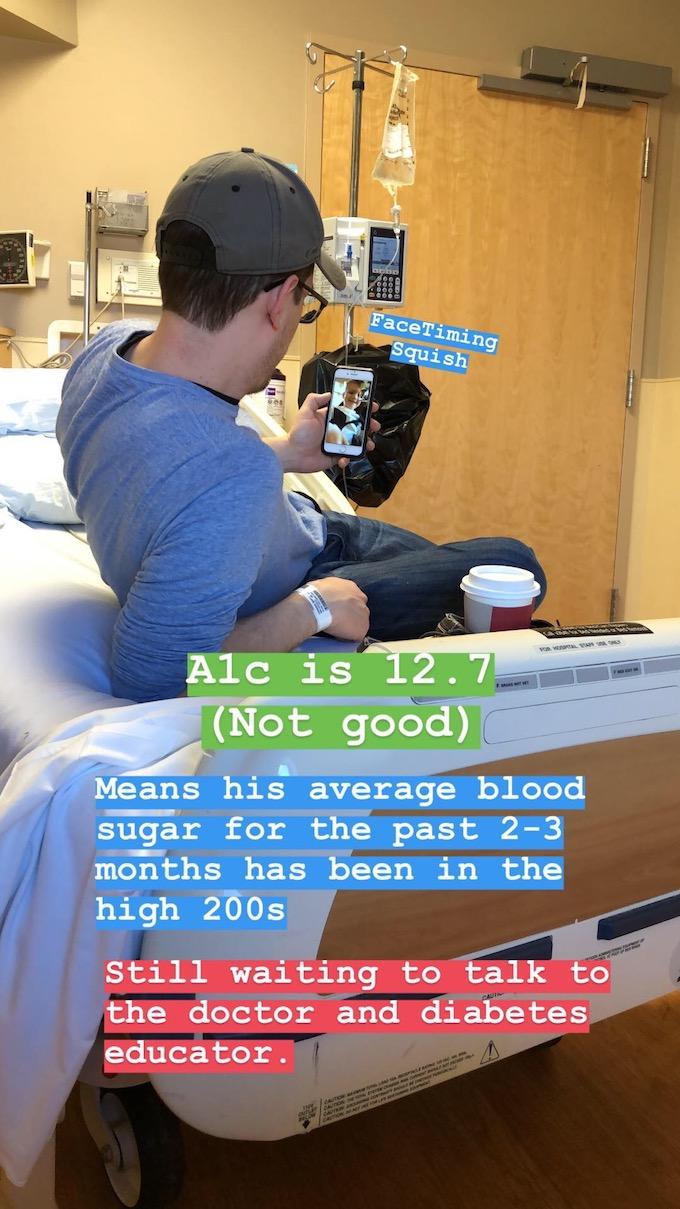
Saturday morning he was officially diagnosed with Type 1 diabetes. We got the results of his Hemoglobin A1c blood test back and it was 12.7, which is extremely high. A1c is a test used to measure a person's average blood glucose level over the past 2-3 months. Normal is below 5.7. So, his results indicated that his average blood sugar over the past 3 months was in the high 200's. Normal blood sugar levels are 70-99 when fasting and below 140 within 2 hours after eating.
They decided to keep him at the hospital one more night so that they could continue to track his blood sugar and see how it was responding to the insulin. We were also supposed to speak to a diabetes educator but apparently, at the hospital we were at, they don't work on the weekends. So, since we were there Friday night to Sunday afternoon, we didn't speak to one.

However, he had an awesome nurse that really stepped up to help teach us about some of his new daily activities like checking his blood sugar and injecting insulin and let him practice on himself so he was comfortable doing it.
Sunday afternoon we were sent home with instructions to check his sugar at least 4 times a day and see an endocrinologist within 3 days. We were completely overwhelmed but trying to just take things one day at a time. On the way home, we stopped at the pharmacy to pick up all the supplies including a glucose monitor, test strips, lancets, alcohol swabs, insulin pens and more.

The first time we had to do everything at home was incredibly stressful. Both the glucose monitor and the insulin pens were slightly different than the ones he'd been practicing with at the hospital. The glucose monitor was different. The insulin pens he had practiced on had a type of safety cap so only the very tip of the needle came out wheras the kind we came home with had the whole needle exposed. At the hospital they threw away the insulin pens after injecting him, wheras the ones we came home with you just throw away the needle and the pen itself has enough insulin in it for many injections.
We tried to make an appointment with an endocrinologist, found out we needed a referral, got a referral and still haven't even been able to get an appointment on the calendar (two weeks later). Our hope is to get him on both a continuous glucose monitor and an insulin pump as soon as possible, we're just not sure exactly how soon that will be.
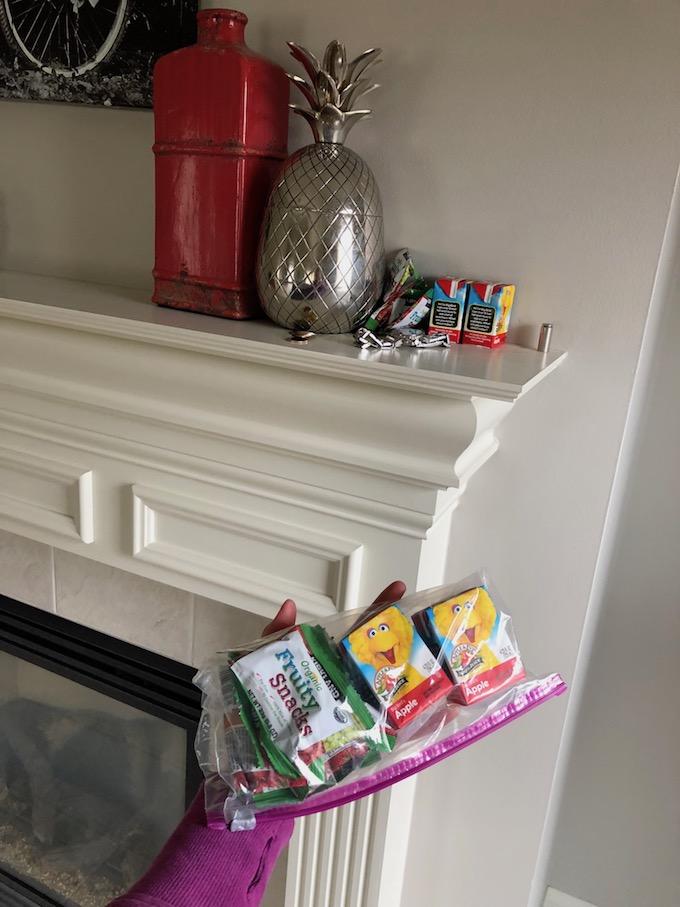
Luckily my husband was able to take a few days off work to take some time and adjust to everything. We experienced our first low blood sugar episode and now have stashes of fruit snacks and juice boxes all around the house, in both cars, in my purse, out in the garage gym, at work, next to the bed etc.
We definitely would not have survived the first few days without my online community. My friend Mary Ellen (who is an RD and Type 1 diabetic herself) has been endlessly patient and answered dozens of texts from me each day as new questions and situations came up that we had no clue how to handle. We also had several certified diabetes educators who follow me on social media reach out and be willing to answer questions for us.
I may be a Registered Dietitian, but that does not automatically make me a diabetes expert. So I am learning right along with him.
We ordered a few books that people recommended (Think Like A Pancreas and Sugar Surfing) and also went back to see our family doctor to answer some immediate questions, as well as get prescriptions for new supplies as we discovered that the needles that came with the insulin pens he got were a bit too long for him. You're supposed to pinch your skin and inject the insulin, without pushing it into the muscle. Since he doesn't have a ton of body fat, sometimes it's tricky to keep a longer needle from going in too far. We also discovered the finger-sticking needles he got were too fine and not making his fingers bleed enough to get a sample to test his blood sugar.
We've been testing his blood sugar about 6 times a day and are using an app to keep track of all the readings so we can analyze them and share with doctors. We have learned how to count carbs, looked up the carb counts of a lot of foods, learned how to dose insulin and treat highs and lows and more….all in the span of just a few days.
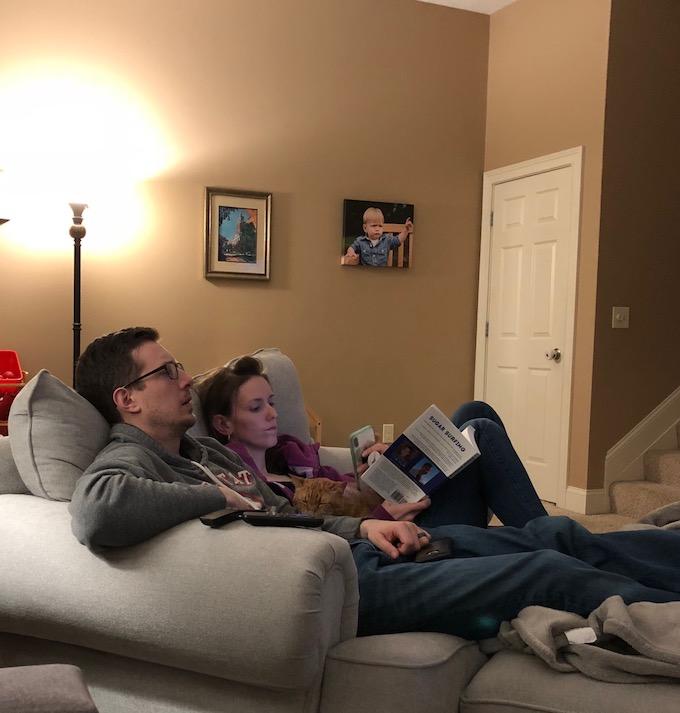
So Many Questions
You never really think about just how many questions and unknowns come along with a diagnosis like this until it actually happens and you find yourself with a mile long list of questions. Here are just some of the things that came up:
- Can he take his long acting and short acting insulin at the same time in the morning?
- What should his daily carb goal be?
- Should he be taking insulin to correct his blood sugar levels before meals as well as in anticipation of what he's about to eat?
- How many grams of carbs does he need to correct a low?
- How will he know when his blood sugar gets too low?
- What if we're going out to eat and don't know how long it will be until we eat? Does he need to take all the supplies with him to the restaurant?
- What do we do the first time he gets sick and doesn't feel like eating? Or if he takes insulin and then throws up?
- How should he handle drinking alcohol?
- Should he be taking insulin before bed even if he's not having a snack? What should he be eating for a bedtime snack?
- What should he do about exercising? Eat beforehand? Take insulin? Not take insulin? Can he exercise when his sugar is high?
- How soon can we get a pump and a CGM?
- Are our kids going to get Type 1?
- What do we do if we go on vacation and he loses his insulin?
These are just a few of the questions we had to work through after his diagnosis. And I still have a running list of questions for when we finally get in to see the endocrinologist.
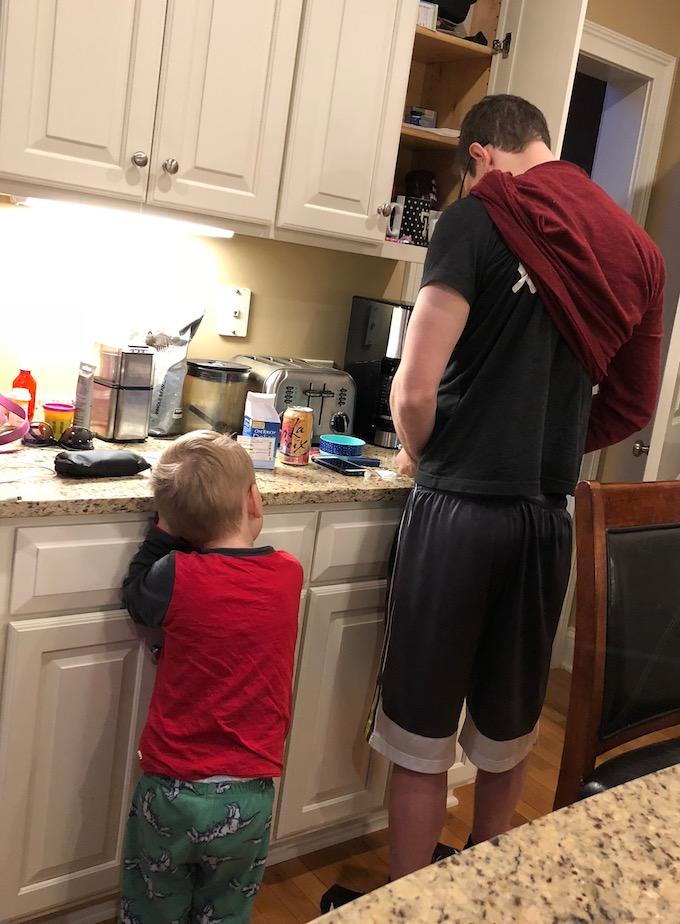
A Family Affair
This diagnosis is obviously having a huge impact on my husband. We're in for a lifelong series of expenses and constant adjustments. It's his body and he's the only one who truly knows how he's feeling. He has to be responsible about checking his sugar levels and taking insulin. He has to pay attention to how certain foods make him feel, what causes his sugar to spike and drop, etc. He has to prick his finger and inject himself constantly until we're able to get him on a pump and get him a continuous glucose monitor.
There will constantly be new experiences that he has to learn how they will affect his body (lifting, cardio, yardwork in the summer, playing with the kids, not getting enough sleep etc). He has to remember to bring his supplies with him to work so he has his insulin in case he gets stuck at work and can't come home for lunch, or in case he goes low during a meeting at work and needs to raise his blood sugar. It's way harder to eat out if he doesn't know the exact carb counts for what's on the menu. (Not impossible…just takes more planning)

Right now our kids are fairly unaware of what's going on but Squish does see him checking his sugar and giving shots and asks questions about it so we're trying to find ways to explain it to him in a way his three-year-old mind can understand. As they get older, we'll have to teach them what signs to look for when daddy has low blood sugar and what to do to help him (ie how to call 911, where his food supplies are, etc). We're also dealing with the fact that the fruit snacks and juice boxes we have on hand for daddy are some of Squish's favorite snacks…so we have to keep him out of those.
As for how it's affecting me? It is…in a huge way. I'm constantly worried about him, want to know what his blood sugar is all the time, am always afraid it's going to go low while he's driving, or in the middle of the night while he's sleeping (one of the main reasons why we want to get him on a CGM as soon as possible…because you can set alerts to go off if it goes too high or too low and i'll be able to see his blood sugar levels through an app on my phone).
I'm worried about complications that could arise in the future and whether our kids are going to get this same diagnosis. I've had to learn how to use the glucose monitor to check his sugar, how to inject insulin so he can rotate injection sites to different parts of his body that he can't reach by himself (like his tricep).
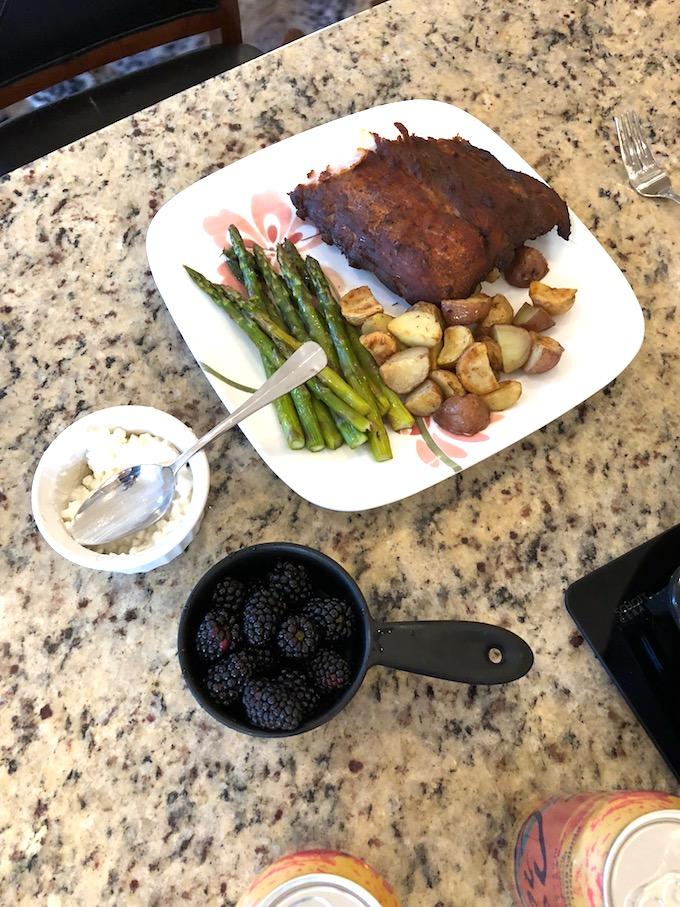
I've had to make a lot of adjustments to the way I cook. No longer can I just throw whatever I feel like in a pan. He needs to know how many carbs he's eating so I have to do a lot of measuring. I made a stuffed pepper bake the other day and I measured all the ingredients, looked up the carb counts for all of them, divided the dish into 4 servings etc so he'd know exactly how many carbs were in each portion. Same thing with the salmon burgers I made for dinner last night. I haven't exactly figured out yet how to tackle things like soups and casseroles where there's so much stuff all mixed together making it harder to measure what's in each portion but I'm sure that will come with time and practice.
While hubby doesn't need to follow a crazy low-carb diet, he does have to be smarter about the carbs he's eating. No more snacking willy-nilly on things like chips and pretzels…instead, he's focusing more on getting his carbs from things like fruits, vegetables and whole grains. It's not a huge change from the way he was eating before but there have definitely been some adjustments.
Some people have asked if that means I'm eating low carb..and the answer is no not really…I'm still snacking on chips with hummus while drinking a beer and eating a handful of m&ms before bed…but I'm definitely more aware. And I do occasionally feel guilty when I'm eating a carb-heavy snack like that that I know isn't the best choice for him.
Similarly, I'm affected by things like the fact that we probably won't be ordering a basket of chips and salsa when we go out to eat at a Mexican restaurant anymore..because I'd be eating them by myself. Or the fact that I probably won't bake my standard cookies as often anymore because he won't be eating them as frequently and I don't want them to be around to tempt him. Again, it's not like he can't have sweets…but before, he could come home from work and grab a cookie and it was no big deal. Now he needs to know exactly how many carbs are in that cookie, factor that into the amount of insulin he's taking etc.

I'm trying to observe him closely and learn how his moods change as his blood sugar changes. We know that when it's super high or super low, he gets increasingly irritable and anxious (not his fault) so during those times I'm trying to manage the kids and keep them calm and out of his way while he works on regulating his sugar.
I'm trying to plan ahead, make sure we know what we're doing and where we're going whenever we leave the house so we know what supplies to take, whether he needs to eat beforehand, pack a snack etc. We can't even just leave on a spur of the moment family walk anymore without making sure we have some fruit snacks or a juice box to take with us in case his blood sugar goes low.
I'm sure reading through all this may sound like I'm complaining…but I'm not. I'm just sharing our experience and give people an overall picture of what it's like to go through a diagnosis like this. It's overwhelming and scary and definitely impacts everyone in the family and all aspects of your life together.

The good news is, we make a great team. We're both smart people and are willing to work hard together to figure things out, get our questions answered and experiment with various things to figure out what works best. We were already eating healthy and exercising so although I've had to make some adjustments in the kitchen, they've been fairly minor and overall, our lifestyles changes have been relatively minor and more adaptive versus a major diet and exercise overhaul.
The medication side has definitely been the most challenging for us. We're still making changes and trying to figure out what works best to keep his blood sugar under control and we know there's no instant fix. So far we've had to increase his dose of long-acting insulin, change his correction factor (carbs per unit insulin) and split his long-acting insulin in half to take it twice a day instead of just once because it was wearing off too quickly and causing his sugar to get way too high in the morning. We also learned that working out when his sugar was already high makes his sugar spike even higher, whereas if it's normal, working out can make it drop. Almost all the stuff we're doing with the insulin has been based on our own research and with the help of Mary Ellen who has been invaluable in sharing both her clinical knowledge of diabetes and her first-hand experiences.
I'm sure there will be good days and bad days from here on out but we'll face them together and do what we can to make the best of our new normal – life with Type 1 Diabetes. I'm forever grateful that my hubby is so level-headed and is facing this diagnosis with a positive attitude. He's already conquered so many aspects of the disease and is willing to do whatever it takes to stay as healthy as possible for the future.
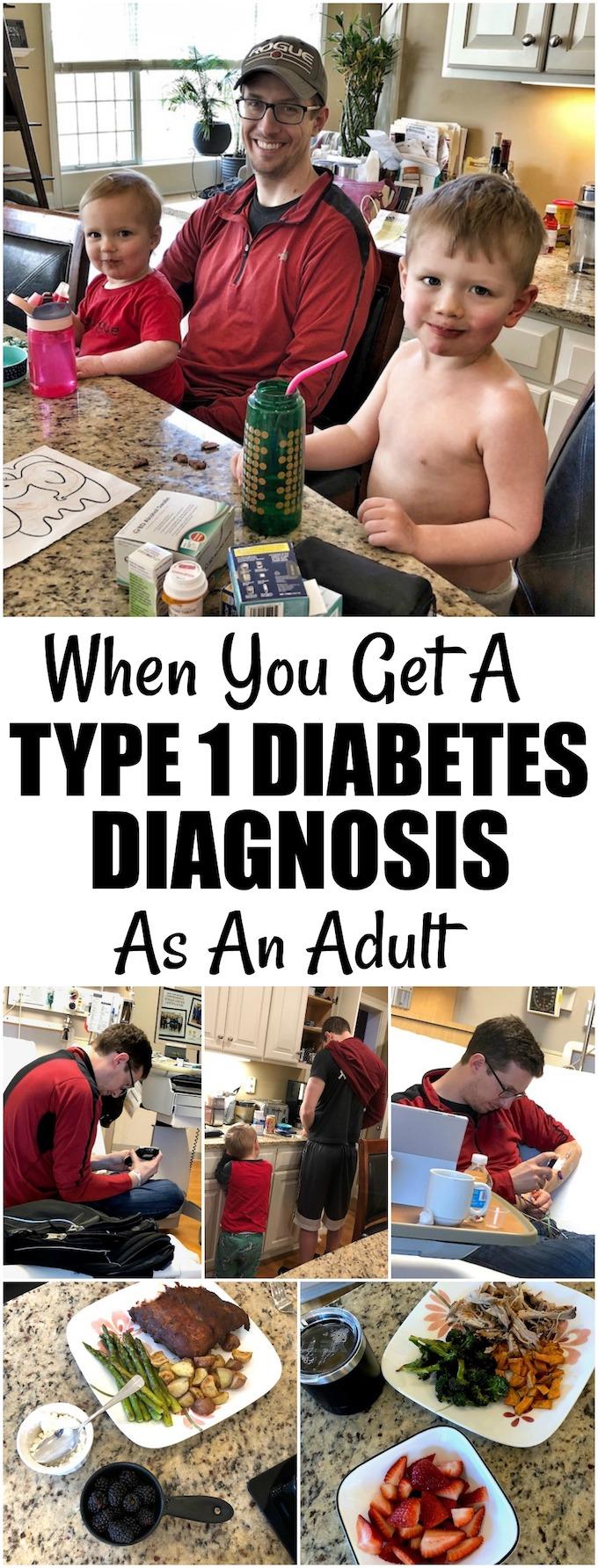
Thanks for letting me share our story! If you have any questions that I didn't already answer, feel free to send them our way!
Enjoy!
–Lindsay–
The post When You Get Type 1 Diabetes As An Adult appeared first on The Lean Green Bean.
Original Content: When You Get Type 1 Diabetes As An Adult
No comments:
Post a Comment